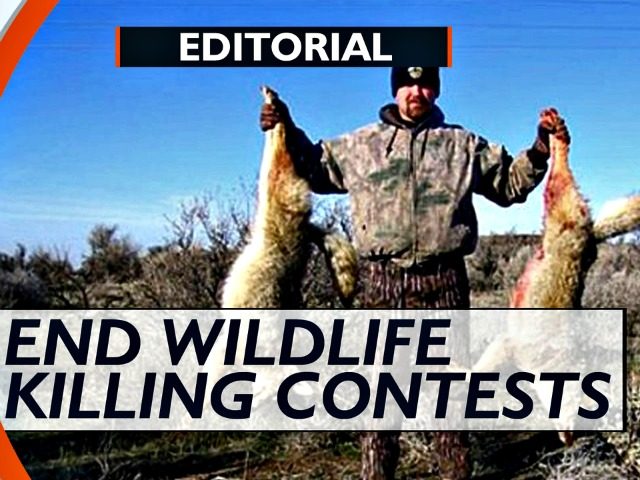March is one of the busiest of the months in state legislatures, as they rush to churn out laws before May when most legislatures shut down. It’s also when multi-state campaigns by national interest groups become evident. This year, the ultra-liberal Humane Society of the United States (HSUS) has initiated a broad attack on the great American tradition of hunting.
In at least six states – New York (AB 722), New Jersey (SB 3541), Oregon (SB 723), New Mexico (SB 76), Wisconsin (SB 30), and Montana (SB 186) – HSUS and its allies have initiated the introduction of nearly identical anti-hunting bills. These 2019 bills would ban hunting contests and competitions. The 2019 campaign attempts to build on momentum from when Vermont passed a law banning coyote hunting contests in 2018. Vermont’s was the first such law. But it followed a 2014 ban imposed by bureaucrats in – where else? – California.
What’s a hunting contest? Just about any competitive hunting event. Plenty of states have annual “governor’s hunts,” in which hunters see who can shoot the biggest turkey, the biggest pronghorn antelope, or the most pheasants. Towns and stores sponsor “biggest buck” contests during whitetail deer season. Field trials test the skills of hunting dogs all year long. And plenty of states have coyote hunting contests in which hunters attempt to shoot the greatest number of coyotes or the largest coyote. That last category is especially important for non-hunters, as the massive proliferation of coyotes across the country and into the suburbs has resulted in increased attacks on children and pets.
As someone who has competed in various hunting contests, I can say with certainty that there’s nothing inhumane about them. They celebrate hunting, promote the sport, and allow hunters to test their skills against one another. They also emphasize the humane, ethical harvesting of the game animals.
HSUS calls them “wildlife killing contests” and asserts that such contests involve “cruel” methods of hunting, which is a flat-out lie. The Humane Society’s real problem with hunting contests is based on emotion rather than on rational thought. They think it’s heartless for a hunter to kill any animal; and doing so in a competition really offends them.
But what the Humane Society won’t acknowledge is that hunters have done more to promote the growth of game animal populations than any other group in America. Hunters supported the creation of state fish and game commissions a century ago to establish hunting seasons and limits in order to maximize game animal numbers. And hunters sit on those commissions today. Hunters also lobbied for the Pittman-Robertson Act in 1937, which established an 11% federal excise tax on the sale of hunting equipment. The money is distributed by the Secretary of the Interior to the states to support habitat conservation, hunter education, and to increase the number of game animals. That tax, in addition to hunting license fees collected by the states as well as money raised by private hunting organizations, generates more than $1.6 billion a year for conservation.
The results speak for themselves. In 1900, there were only about 500,000 whitetail deer remaining in North America. Now there are approximately 30 million – more than when European settlers first arrived. In 1900, there were fewer than a million wild turkeys. Now, thanks to hunters and their dollars, there are about six million. In 1900, pronghorn antelope numbers were down to about 13,000. Now there are approximately one million. And the list goes on.
No one cares about sustaining these populations more than hunters. Because we like to hunt the animals, we appreciate their beauty, and we like to feed our families with the healthiest organic meat on Earth, we want to maximize their numbers and habitat.
And, yes, some of us enjoy a contest from time to time to see who bags the biggest one. But there’s nothing heartless about that. It’s just human nature to compete.
More than that, American hunting is under threat as hunter numbers decline. Only five percent of Americans aged 16 and over hunted at all last year. Increasingly, too many young people would rather sit on the couch all day playing a video game, rather than hiking through the woods pursuing real game.
Hunting contests help get people interested and celebrate the hunting tradition. And that’s the Humane Society’s ultimate target—the very activity of hunting. They’d like to see a world in which no-one hunts.
What they fail to realize is that in such a world, the biggest fans of game animals would no longer be fighting to increase their numbers and funding the campaign every step of the way. And without hunters, the population of all such animals would drop dramatically.
If you live in one of the states that is considering a ban on hunting contests, call your state legislators. They could use some rational analysis.
Kris W. Kobach served as the Secretary of State of Kansas during 2011-2019. An expert in immigration law and policy, he coauthored the Arizona SB-1070 immigration law and represented in federal court the 10 ICE agents who sued to stop Obama’s 2012 DACA executive amnesty. During 2001-03, he served as U.S. Attorney General John Ashcroft’s chief adviser on immigration and border security at the U.S. Department of Justice. His website is kriskobach.com. Full disclosure: he also serves on the Board of Directors of Hunter Nation, an organization dedicated to preserving the tradition of hunting and to maximizing wildlife habitat.

COMMENTS
Please let us know if you're having issues with commenting.